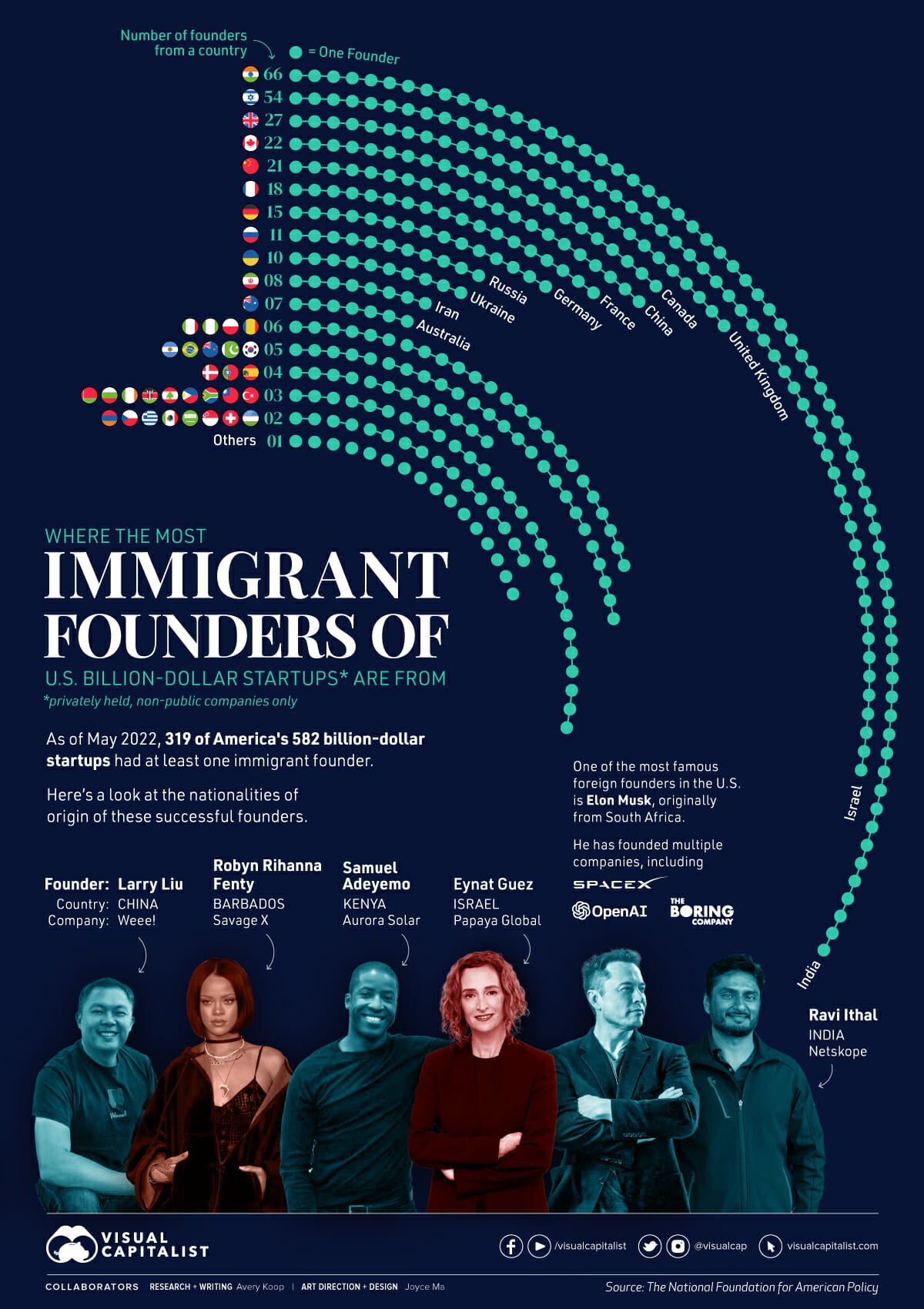The majority of U.S. unicorns—private startups worth more than $1 billion—have at least one immigrant founder, according to the National Foundation for American Policy (NFAP).
While some of the companies and founders are well known, like SpaceX from South Africa’s Elon Musk, hundreds of lesser-known unicorns have been founded from the top talent of just a handful of countries.
This visual using NFAP data lays out the countries which are home to the most U.S. billion-dollar startup founders as of May 2022.
Note: These rankings are based on unicorn valuations as of May 2022. As valuations regularly fluctuate, some companies may have gained or lost unicorn status since that time.
Countries with the Most U.S. Unicorn Founders
Here’s a look at the countries that these immigrant founders come from.
The 382 founders accounted for below have combined to start 319 of 582 U.S.-based unicorns.
|
Rank |
Country |
# Founders of |
|
1 |
India |
66 |
|
2 |
Israel |
54 |
|
3 |
United Kingdom |
27 |
|
4 |
Canada |
22 |
|
5 |
China |
21 |
|
6 |
France |
18 |
|
7 |
Germany |
15 |
|
8 |
Russia |
11 |
|
9 |
Ukraine |
10 |
|
10 |
Iran |
8 |
Far in the lead is India with 66 startup founders and Israel with 54 startup founders. Together, they account for 31% of all unicorn founders listed. In fact, more than half of the immigrant unicorn founders came from just six countries: India, Israel, the UK, Canada, China, and France.
These immigrant founders have helped found many of the world’s biggest startups:
- Stripe was co-founded by Irish brothers Patrick and John Collison
- Instacart’s founder and former CEO, Apoorva Mehta, was born in India, then moved to Libya and Canada as a child.
- Big data startup Databricks was founded by a group of seven computer scientists from the University of California, including five immigrants from Iran, Romania, and China.
Immigration and Entrepreneurship
Though some of these founders came to the U.S. as successful business leaders, the report noted that many immigrated as children or international students.
In addition, there are another 51 founders (not included in the above statistics) that were not immigrants themselves but are first-generation Americans born to immigrant parents. Data from the report also shows that 80% of unicorns have an immigrant in some key role, whether it’s as a founder, a C-level executive, or some other crucial position.
Even historically, some of the biggest companies in the U.S. were not founded by Americans. For example, the founders of Procter & Gamble (NYSE:PG) emigrated from England and Ireland in the early 1800s. And today, one of the biggest companies in the U.S. is NVIDIA (NASDAQ:NVDA), which recently broached a trillion dollar market cap and whose founder is from Taiwan.
The Ever-Changing Unicorn Landscape
While this dataset is from mid-2022, it should be noted that the startup ecosystem has shifted drastically in just the last year.
Rapidly rising interest rates and a slowdown in venture capital have conspired to create a more precarious fundraising environment, leading to down rounds and stagnation for some of these billion-dollar companies.
In Q1 2023, unicorn births declined 89%, suggesting that in upcoming years the unicorn list—and the number of immigrant founders—may be subject to change.

The post Where Are Immigrant Founders Of U.S. Unicorns From? appeared first on Visual Capitalist.





